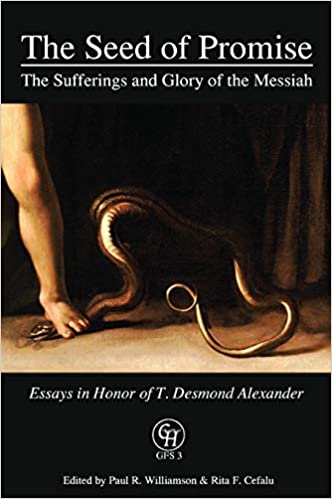Paul R. Williamson and Rita F. Cefalu, eds. The Seed of Promise: The Sufferings and Glory of the Messiah: Essays in Honor of T. Desmond Alexander. GlossaHouse Festschrift Series 3. Wilmore: GlossaHouse, 2020. 422 pages. $29.99 (paperback).

Originally published in 1961, Semantics of Biblical Language by James Barr was seen by many as dealing a death blow to the field of biblical theology. Barr was adamant that the discipline lacked the proper tools to carry it into the future. Now, nearly 60 years later, biblical theology as a discipline is thriving. This is due in no small part to the scholarship of theologians like T. Desmond Alexander. The Seed of Promise, edited by Paul Williamson (lecturer in Old Testament, Hebrew, and Aramaic at Moore College in Sydney, Australia) and Rita Cefalu (Ph.D. from Queen’s University, Belfast),commemorates his life and work on his 65th birthday with essays by eighteen leading scholars who reflect the diverse nature and blossoming future of biblical theology in the 21st century.
Structured around the theme of the promised seed of Genesis 3:15 (the protoevangelium), this monumental work walks readers through the biblical storyline, highlighting the promise and sufferings of the seed along the way. The following few examples illustrate the authors’ collective goal of offering unique perspectives on the protoevangelium as it relates to the redemptive-historical narrative. James Hamilton Jr. offers a thorough intertextual analysis of the seed promise, demonstrating that at each step of the way, the biblical texts point to Jesus as the “skull crushing seed of the woman” (per the title of his essay). Philip Johnston invites readers to look at the Psalms through the redemptive-historical lens of the seed of promise. Christians, he argues, “can and must reread all the psalms in the light of Jesus, and recontextualize them in the light of the whole New Testament” (161). Graeme Goldsworthy explores, with care and precision, the contributions of wisdom, covenant, and redemptive history to the overarching biblical narrative, arguing that the awareness of redemption found “in the suffering and exaltation of Messiah” is encapsulated within the notion of wisdom (179). Dane Ortlund forays into the Gospel of Mark and asserts that Mark is “arguably the most explicitly centered on the sufferings and glory of the Messiah” (242). Ortlund fits Markan theology within the umbrella of Genesis 3:15, stating that “Mark is drawing on the Old Testament to make sense of Jesus as the Messiah who will both suffer and be raised” (262). Andreas Köstenberger offers an intriguing study of Johannine theology and the “seed” of Genesis 3:15, highlighting the subtle yet evident theme of the cosmic struggle between the line of the “seed” and the line of the serpent in John’s writings.
Each contribution to this study is interesting, thorough, and an embodiment of biblical theology as a burgeoning discipline. Alexander’s contribution to the field, far from consisting only of a list of his own published works, is demonstrated within this volume: a compendium of a new generation of international scholars, each investigating the unity and diversity of God’s word faithfully and applying a variety of approaches to the biblical-theological task. This work is highly recommended for anyone interested in current trends in the discipline of biblical theology.
CBS book notices provide brief descriptive summaries and assessments of new publications in biblical studies and biblical theology. CBS book notices are not full academic book reviews. The present book notice was written by Edward LaRow, a Ph.D. student at Midwestern Baptist Theological Seminary





